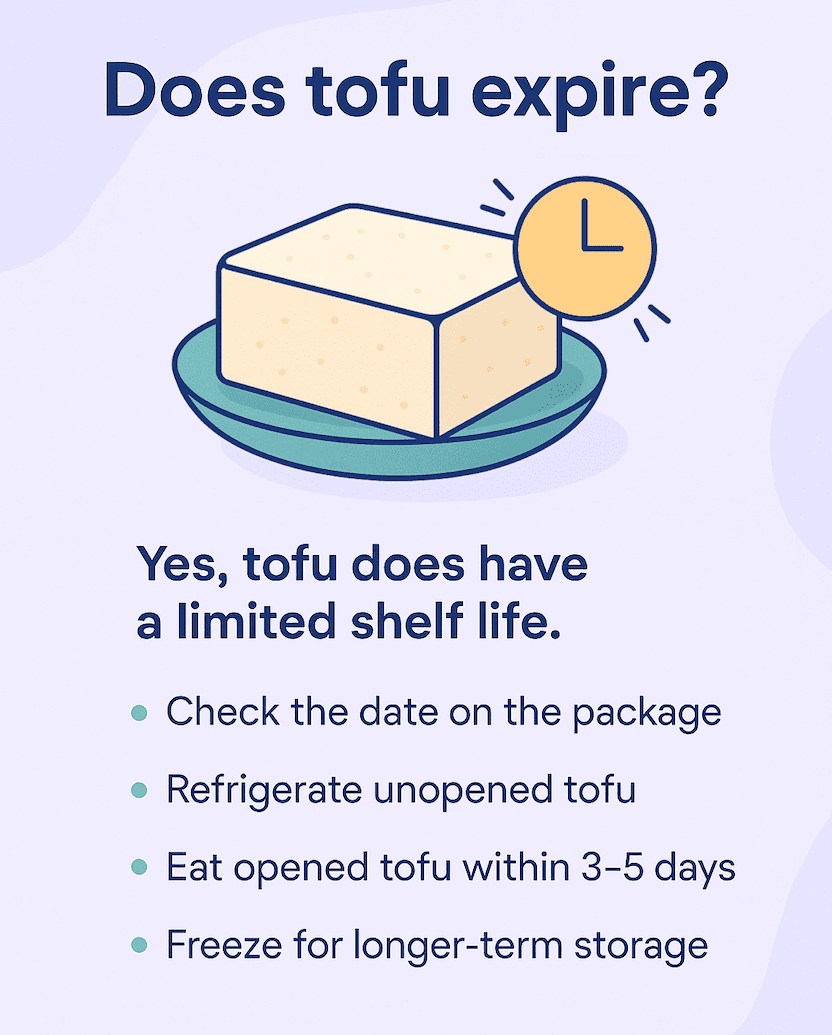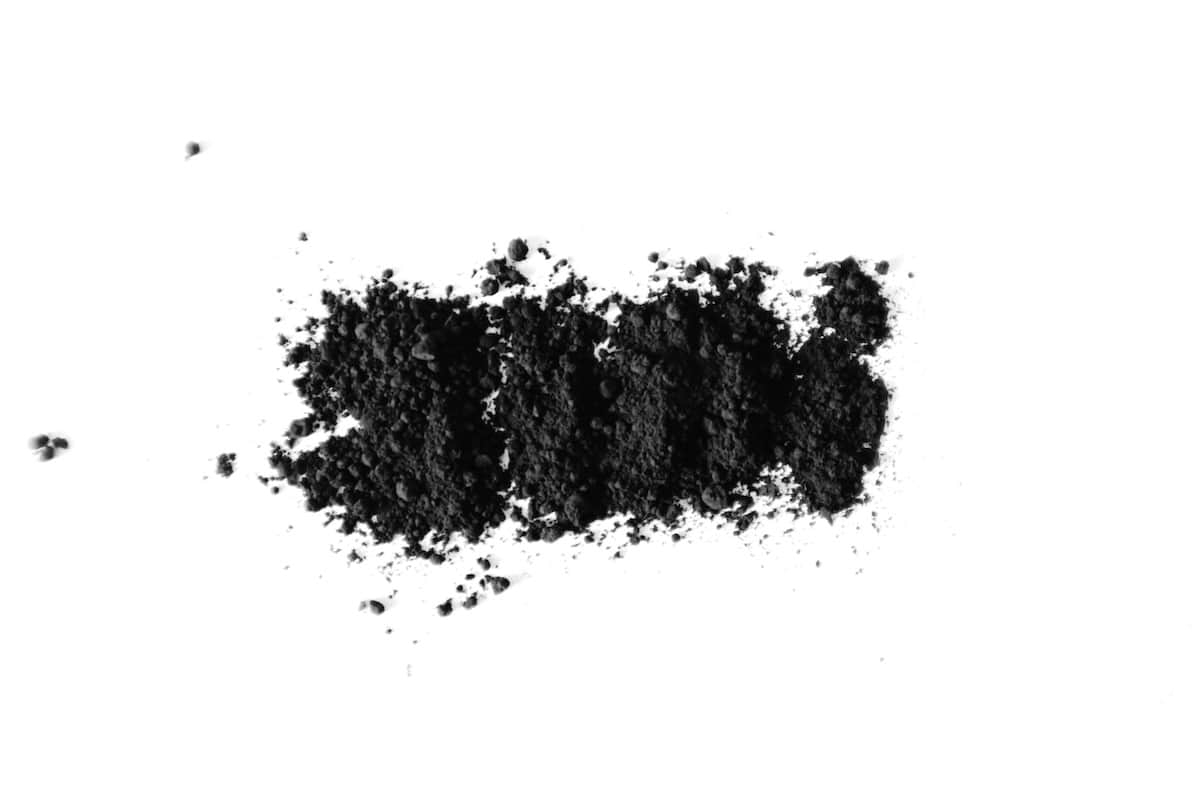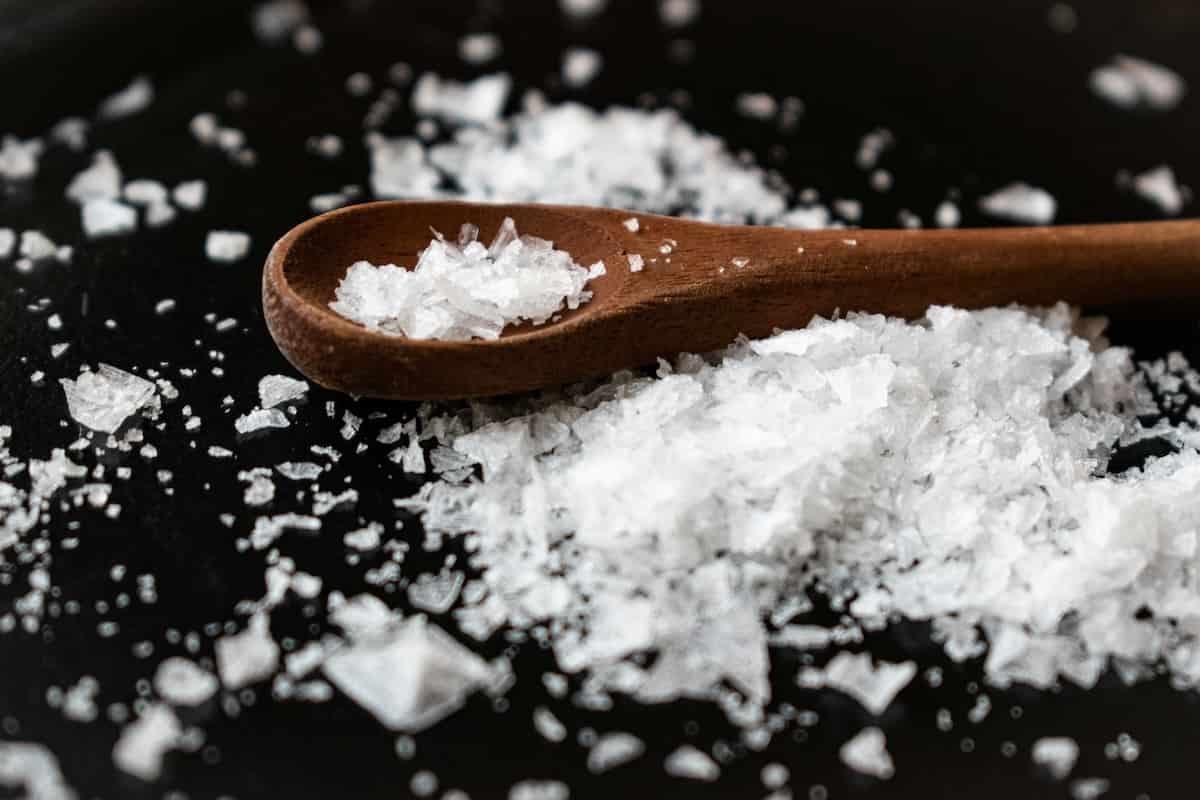Last update: November 4, 2025
7 minute read
Does Tofu Expire? What You Need to Know About Storage and Safety
Wondering if that tofu in your fridge is still good? Learn how to tell when tofu has gone bad, proper storage methods, and safety tips for this plant-based protein.

By Derick Rodriguez, Associate Editor
Edited by Dr. Dimitar Marinov, MD, RDN, PhD

You grab a container of tofu from your fridge, ready to toss it into your stir-fry, but pause. The date on the package was last week. Is it still safe to eat?
Tofu is a staple for anyone eating more plant-based meals, but figuring out if it's still good can be tricky. Unlike meat that changes color or smell in obvious ways, tofu's spoilage signs are harder to spot.
Whether you're meal prepping, trying to waste less food, or just making sure your family stays safe, knowing how to handle tofu properly is important. Here's what you need to know about tofu expiration, storage, and when to throw it out.
Key takeaways
- Unopened tofu lasts 3-5 days past its date if kept cold; opened tofu should be used within 3-5 days
- Bad tofu smells sour, feels slimy, or shows visible mold—trust your senses over dates alone
- Freezing tofu changes its texture but keeps it safe for up to 5 months
How long does tofu actually last?
The answer depends on whether your tofu is still sealed or already opened.
Unopened tofu typically stays good for 3-5 days beyond the printed date, as long as it's been kept in the fridge. That date is usually a "best by" estimate, not a hard safety deadline. The packaging creates a clean environment that protects the tofu from bacteria.
Once you open that package, things speed up. Opened tofu should be eaten within 3-5 days, even if the original date hasn't passed yet. When air hits the tofu, bacteria can start growing and breaking down the protein.
Shelf-stable tofu (the kind sold at room temperature in special packages) lasts months unopened but follows the same 3-5 day rule once you open it and put it in the fridge.
VitaRx Tip
Write the opening date on your tofu container with a marker. It's way easier than trying to remember when you opened it three days later.
What are the signs that tofu has gone bad?
Tofu doesn't always make it obvious when it's gone bad, but you can figure it out with a few simple checks.
The smell test
Fresh tofu has a mild, slightly sweet smell or no smell at all. If it smells sour, funky, or just "off," that's your signal to throw it out. The smell might remind you of old dishwater or spoiled milk.
The touch test
Run your fingers over the surface. Good tofu feels smooth and a little moist. Bad tofu develops a slimy film that won't rinse off, kind of like how raw chicken gets when it's spoiled.
The look test
Tofu should be white or cream-colored all over. Yellow or brown spots mean bacteria are growing. Any fuzzy patches mean mold, which can go deeper than what you see on the surface.
The taste test (use carefully)
If everything else seems okay but you're still not sure, a tiny taste can help. Spoiled tofu tastes noticeably sour or bitter. Spit it out right away if something seems wrong.
When you're not sure, it's better to be safe and toss it. Getting sick from bad tofu isn't worth saving a few dollars.

How should you store tofu to make it last?
The way you store tofu makes a huge difference in how long it stays fresh.
For unopened tofu: Just keep it in the fridge at 40°F or below. Store it toward the back where the temperature stays steady, not in the door where it warms up every time someone opens the fridge.
For opened tofu: This needs more care.
Here's what to do:
- Put the tofu in a container with a lid
- Fill the container with water until the tofu is completely covered
- Change the water every single day
This simple routine stops bacteria from growing and keeps the tofu from drying out or picking up weird fridge smells. Think of it like keeping cut vegetables fresh in water.
If you forget to change the water for a day, it's usually fine, but the water might look cloudy. Cloudy water by itself doesn't mean the tofu is bad, just that it needs fresh water.
Some people skip the water and just wrap tofu in plastic wrap. This works for a day or two, but dries the tofu out faster.
Can you freeze tofu?
Yes, and freezing actually solves two problems.
Frozen tofu stays safe for up to 5 months. If you bought too much or won't use it in time, freezing stops it from going to waste. Drain the tofu, cut it into pieces if you want, and freeze it in a container or freezer bag. You don't need to press it first.
Here's something cool: freezing changes tofu's texture in a way some people actually like better. The water inside forms tiny ice crystals throughout the tofu.
When you thaw it, those crystals leave small holes that make the texture chewier and spongier, almost like meat. This frozen-then-thawed tofu soaks up sauces better and gets crispier when you cook it.
To thaw it, move it to the fridge the night before or use your microwave's defrost setting. Squeeze out the extra water before cooking. The new texture won't work for every recipe (soft tofu desserts are out), but for stir-fries, curries, and grilled tofu, lots of people prefer it this way.
If you don't like the texture change, stick to fresh tofu and only freeze it if you really need to.
Does the type of tofu matter for shelf life?
Different kinds of tofu last slightly different amounts of time, mostly because of how much water they have.
Tofu Type | Opened Shelf Life | Special Notes |
|---|---|---|
Silken tofu | 2-3 days | Spoils fastest; harder to detect by touch |
Firm tofu | 3-5 days | More forgiving; easier to store |
Extra-firm tofu | 3-5 days | Lasts longest; holds less water |
Flavored tofu | 3-5 days | May have preservatives; can mask spoilage smell |
Silken tofu goes bad fastest because it's delicate and full of moisture. Those shelf-stable boxes last forever unopened, but once opened, use them within 2-3 days max. The soft texture makes it harder to feel if it's gone slimy, so rely more on smell.
Firm and extra-firm tofu last the full 3-5 days after opening because they're denser and hold less water. They're also more forgiving if you forget to change the storage water.
Flavored tofu (like teriyaki or sriracha kinds) sometimes has preservatives that help it last a bit longer, but don't push it. The added flavors can also hide early spoilage smells, so be extra careful.
What nutrients does tofu provide (and why does freshness matter)?
Tofu is more than just a substitute for meat. A half-cup of firm tofu has about 10 grams of complete protein, which means it contains all nine amino acids (protein building blocks) your body needs but can't make on its own. That's pretty rare for a plant food.
Tofu also gives you:
- Calcium (if made with calcium sulfate) for strong bones
- Iron to help carry oxygen in your blood
- Magnesium for muscle and nerve function
- Isoflavones (plant compounds that may help with heart health)
Freshness matters because as tofu breaks down, bacteria can reduce its nutrition and create toxins that make you sick. Spoiled protein foods are especially risky because bacteria love growing on them.
If you eat a lot of tofu as your main protein (especially if you're vegetarian or vegan), combining it with other nutrients helps your body absorb everything better.
For example, the iron in tofu absorbs better when you eat it with vitamin C-rich foods like bell peppers or broccoli. If you're building a supplement routine to fill gaps in a plant-based diet, taking our brief health quiz can show you which vitamins and minerals work best with what you're already eating.
Frequently asked questions (FAQ)
Here are some of the most frequently asked questions about tofu.
Final thoughts
Tofu doesn't have to be confusing. Pay attention to dates, trust your senses, and store it the right way. Changing the water daily is the single best thing you can do to make opened tofu last longer.
Whether you're adding more plant-based meals to your week or using tofu as your main protein, keeping it fresh protects your health and saves you money. And if you're curious about what other nutrients might be missing as you eat more plant-based foods, building a personalized supplement routine can fill those gaps without the guesswork.
Sources and references
Editor

Derick Rodriguez
Derick Rodriguez focuses on editing health and wellness-related content. With over half a decade of experience in the digital realm, Derick has developed a unique skill set that bridges the gap between complex health concepts and accessible, user-friendly communication. His approach is deeply rooted in leveraging personal experiences and insights to illuminate the nuances of health and wellness topics, making them more approachable and empowering readers with knowledge and confidence.
Fact checker

Dr. Dimitar Marinov
Dr. Marinov has years of experience in scientific research and preventive and clinical medicine. His publications in peer-reviewed journals are on nutritional status, physical activity, and musculoskeletal disorders among adolescents.
At VitaRx, we're not just passionate about our work — we take immense pride in it. Our dedicated team of writers diligently follows strict editorial standards, ensuring that every piece of content we publish is accurate, current, and highly valuable. We don't just strive for quality; we aim for excellence.
Related posts
While you're at it, here are some other relevant articles you might be interested in.

Get your personalized vitamin recommendations in less than
5 minutes.
Get your personalized vitamin recommendations in less than
5 minutes.






